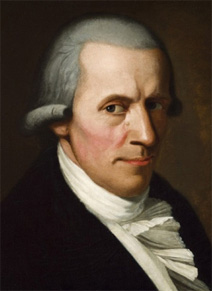| Profile | Major Works | Resources |
Christian Conrad Wilhelm von Dohm, 1751-1820.

German Cameralist, liberal and diplomat.
Originating from Lemgo (C of Lippe, Westphalia), Christian Wilhelm Dohm studied theology and law at Leipzig. His early efforts to obtain substantive government positions came to naught, so Dohm picked up his pen and joined the Enlightenment's "republic of letters". Like many philosophes, Dohm had a fascination with Asia, and his first books relate to European travels in Asia. A critic of European colonialism and imperialism, Dohm's long term project was to prove that the origins of civilization emanated from India and China.
In 1776, C.W. Dohm was appointed professor of finance and statistics at the Collegium Carolinum of Cassel (Hesse-Kassel). Dohm was the founder (along with Heinrich Christian Boie) of the Deutsches Museum, published in Leipzig, which ran from 1776 to 1788. In the first number of which Dohm presented a strong article calling for freedom of the press. Dohm is said to have produced the German translation of Thomas Paine's Common Sense in 1777.
In 1776, Dohm's colleague at Cassel, Jakob Mauvillon, published an essay on Physiocracy, inviting comments on the new economic system. Dohm rose to the challenge, publishing a response in a 1778 article in Deutsches Museum (subsequently reprinted as a pamphlet, with an introduction by Sonnenfels). Dohm was highly critical of Physiocrats, firstly casting doubt on the practicality of their policy schemes, before moving on to a direct critique of theoretical assumptions, laying out the several points of the doctrine. Dohm, who had recently read Adam Smith's Wealth of Nations, reiterates Smith's critique and articulates much the same objections to their land-obsessive theory. Mauvillon composed a rejoinder to Dohm, defending Physiocracy in a series of letters (published in 1780).
Dohm resigned from teaching in 1779 and joined the Prussian civil service, appointed as a royal archivist in Berlin. It was shortly after this that Dohm published one of his most famous works, a 1781 tract boldly calling for the emancipation of the Jews in Germany (and elsewhere). Apparently written at the request of Moses Mendelssohn, and addressed to the governments and rulers of the Holy Roman Empire, Dohm mounted a sober defense of the European Jewry against anti-Semitic accusations and prejudices, with a clear eye to emphasizing the practical political and economic benefits of emancipation. Rather than a passionate plea, Dohm's carefully arrayed arguments and measured tone were geared to seem reasonable and acceptable to German officialdom and public opinion (although a second 1783 edition, taking into account responses to the first, was more heated in tone and pulled fewer punches). Dohm's treatise was highly influential and helped ease Joseph II of Austria's 1782 tolerance decrees.
Later commentators sometimes try to link Dohm's objection to Physiocracy with his defense of the Jews. Dohm had a common underlying Cameralist outlook which recognized the importance of commerce and industry in economic growth and prosperity. In the Physiocrat's obsession with land and dismissal of 'sterile' sectors, Dohm may have sensed traces of anti-Semitic prejudice, or perhaps just feared their doctrines might be deployed to reinforce them.
Dohm subsequently rose to privy councillor to Frederick II the Great of Prussia in 1783. In the administration of Frederick William II, Dohm took up more diplomatic missions. He was the Prussian representative in Cologne from 1786 to 1796 and served as the Prussian representative to the congress of Rastatt in 1797. In 1807, Dohm entered the service of Jérôme Bonaparte, King of Westphalia, retiring in 1810.
|
Major Works of Christian Wilhelm Dohm
|
|
HET
|
|
Resources on C.W.Dohm Contemporary
Modern
|
All rights reserved, Gonçalo L. Fonseca
